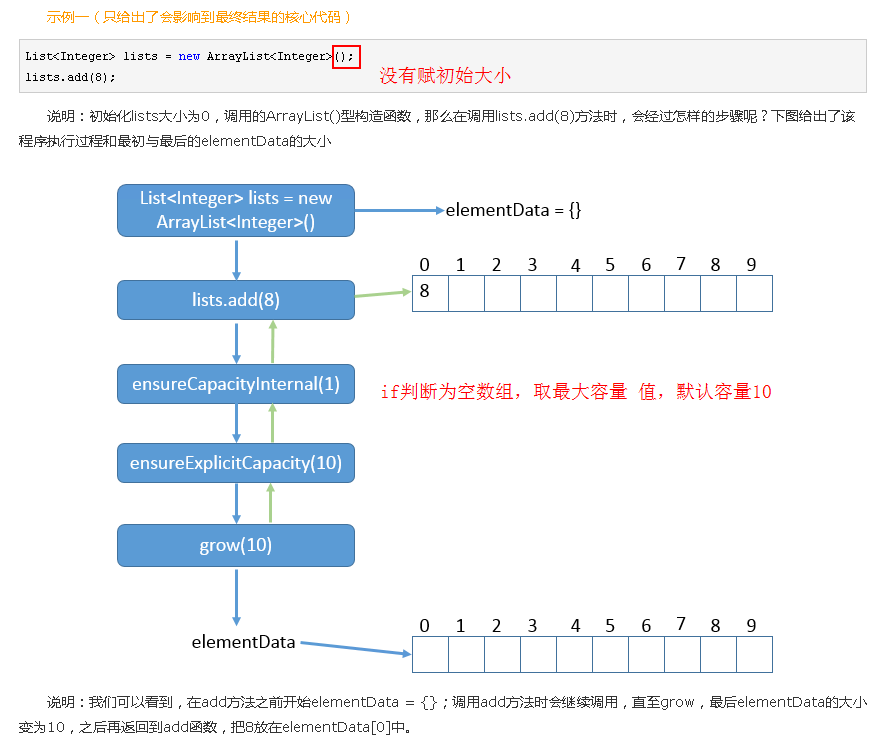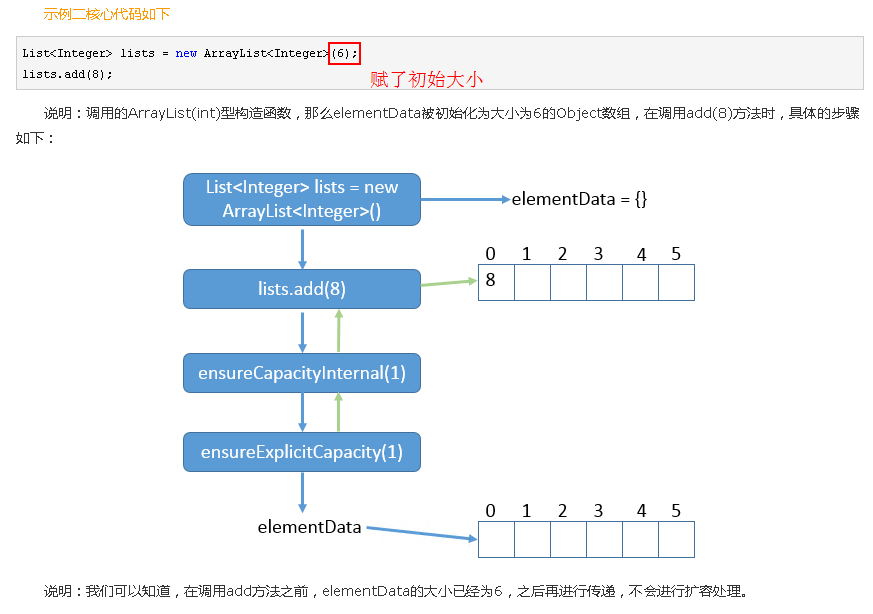【补充说明:】
【modCount】
在父类AbstractList中定义了一个int型的属性:modCount,记录了ArrayList结构性变化的次数。
protected transient int modCount = 0; * 在ArrayList的所有涉及结构变化的方法中都增加modCount的值,包括:add()、remove()、addAll()、removeRange()及clear()方法。这些方法每调用一次,modCount的值就加1。
注:add()及addAll()方法的modCount的值是在其中调用的ensureCapacity()方法中增加的。
【调用add()方法时,调用的函数:】
程序调用add,实际上还会进行一系列调用,可能会调用到grow,grow可能会调用hugeCapacity。
add ——>ensureCapacityInternal ——>ensureExplicitCapacity - - ->grow - - ->hugeCapacity
添加 确保内部容量(是否扩容) 确保明确的容量 扩容函数 指定新容量
实例看图
【总结】:
增:仅是将这个元素添加到末尾。操作快速
删:由于需要移动插入位置后的元素,并且涉及到数组的复制。操作较慢
改:直接对指定位置元素进行修改,不涉及元素的挪动和数组赋值。操作快速
查:直接返回指定下标的数组元素。操作快速
ArrayList有其特殊的应用场景,与LinkedList相对应。其优点是随机读取,
缺点是插入元素时需要移动大量元素,效率不太高。[查找修改快而插入删除慢的特点]
【ArrayList的一些属性:】
public class ArrayList extends AbstractList
implements List, RandomAccess, Cloneable, java.io.Serializable
{
/**
* 版本号
*/
private static final long serialVersionUID = 8683452581122892189L;
/**
* Default initial capacity.
* 默认初始容量
*/
private static final int DEFAULT_CAPACITY = 10;
/**
* Shared empty array instance used for empty instances.
* 用于空实例的共享空数组实例 (空对象数组)
*/
private static final Object[] EMPTY_ELEMENTDATA = {};
/**
* Shared empty array instance used for default sized empty instances(实例). We
* distinguish(区分) this from EMPTY_ELEMENTDATA to know how much to inflate(膨胀) when
* first element(元素) is added.
* 用于默认大小的空实例的共享空数组实例。我们将此与EMPTY_ELEMENTDATA区分开来,以了解何时
* 膨胀多少第一个元素被添加(默认长度的空对象数组)
* DEFAULTCAPACITY_EMPTY_ELEMENTDATA
默认长度 空 元素数据
*/
private static final Object[] DEFAULTCAPACITY_EMPTY_ELEMENTDATA = {};
/**
* The array buffer into which the elements of the ArrayList are stored(存储).
* The capacity(容量) of the ArrayList is the length of this array buffer. Any
* empty ArrayList with elementData == DEFAULTCAPACITY_EMPTY_ELEMENTDATA
* will be expanded to DEFAULT_CAPACITY when the first element is added.
*
* ArrayList的元素存储在其中的数组缓冲区。ArrayList的容量是此数组缓冲区的长度。
* 任何使用elementData == DEFAULTCAPACITY_EMPTY_ELEMENTDATA为空的ArrayList
* 将在添加第一个元素时扩展到DEFAULT_CAPACITY。(元素数组)
*/
transient Object[] elementData; // non-private to simplify nested class access
/**
* The size of the ArrayList (the number of elements it contains).
* 实际元素大小,默认为0
* @serial
*/
private int size;
【构造函数:】
/**
* Constructs an empty list with the specified(指定) initial capacity.
* 构造具有指定初始容量的空列表
*
* @param initialCapacity the initial capacity of the list
* @throws IllegalArgumentException if the specified initial capacity
* is negative
*/
public ArrayList(int initialCapacity) {
//初始容量大于0
if (initialCapacity > 0) {
//初始化元素数组
this.elementData = new Object[initialCapacity];
//初始容量为0
} else if (initialCapacity == 0) {
//元素数组 = (空数组实例/空对象数组)
this.elementData = EMPTY_ELEMENTDATA;
} else {
//初始容量小于0,抛出异常
throw new IllegalArgumentException("Illegal Capacity: "+
initialCapacity);
}
}
/**
* Constructs an empty list with an initial capacity(容量) of ten.
* 构造一个初始容量为10的空列表
*/
public ArrayList() {
//无参构造函数,设置元素数组为空,长度为10
this.elementData = DEFAULTCAPACITY_EMPTY_ELEMENTDATA;
}
/**
* Constructs a list containing the elements of the specified
* collection, in the order they are returned by the collection's
* iterator.
* 构造一个包含指定集合元素的列表,其顺序由集合的迭代器返回。
* @param c the collection whose elements are to be placed into this list
* @throws NullPointerException if the specified collection is null
* 集合参数构造函数
*/
public ArrayList(Collection c) {
//转换为数组
elementData = c.toArray();
//参数为非空集合
if ((size = elementData.length) != 0) {
// c.toArray might (incorrectly) not return Object[] (see 6260652)
//是否成功转换为Object类型数组
if (elementData.getClass() != Object[].class)
//不为Object数组,进行复制
elementData = Arrays.copyOf(elementData, size, Object[].class);
} else {
// replace(替换) with empty array. 替换为空数组
this.elementData = EMPTY_ELEMENTDATA;
}
}
【扩容相关下函数:】
//按照函数名意为:确保内部容量 函数 / 扩容函数
private void ensureCapacityInternal(int minCapacity) {
//判断元素数组是否为空数组 (DEFAULTCAPACITY_EMPTY_ELEMENTDATA 默认长度的空对象数组))
if (elementData == DEFAULTCAPACITY_EMPTY_ELEMENTDATA) {
//取较大值(默认初始容量,传入的最小容量)
minCapacity = Math.max(DEFAULT_CAPACITY, minCapacity);
}
//调用【确保明确的容量】 函数;数组已经初始化过就执行这一步
ensureExplicitCapacity(minCapacity);
}
//按照函数名意为:确保明确的容量 函数
private void ensureExplicitCapacity(int minCapacity) {
//结构性 修改时+1
modCount++;
// overflow-conscious code
//当传入的最小容量 减去 元素数组的长度 大于0时,需要进行扩容
if (minCapacity - elementData.length > 0)
//调用 【grow函数】对数组进行扩容
grow(minCapacity);
}
/**
* The maximum size of array to allocate.
* Some VMs reserve some header words in an array.
* Attempts to allocate larger arrays may result in
* OutOfMemoryError: Requested array size exceeds VM limit
* 最大数组容量(集合最大容量)
*/
private static final int MAX_ARRAY_SIZE = Integer.MAX_VALUE - 8;
/**
* Increases the capacity to ensure that it can hold at least the
* number of elements specified by the minimum capacity argument.
* 增加容量以确保它至少可以容纳由参数指定的元素数。
*
* @param minCapacity the desired minimum capacity
* 扩容函数
*/
private void grow(int minCapacity) {
// overflow-conscious code
//获取数组的旧容量
int oldCapacity = elementData.length;
//新容量为旧容量的1.5倍
int newCapacity = oldCapacity + (oldCapacity >> 1);
if (newCapacity - minCapacity < 0)
//当新容量 减去 传入的最小容量 小于0时,将传入的最小容量赋值给 新容量
newCapacity = minCapacity;
if (newCapacity - MAX_ARRAY_SIZE > 0)
//如果 新容量 减去 最大数组容量 大于0,
newCapacity = hugeCapacity(minCapacity); //指定新容量
// minCapacity is usually close to size, so this is a win:
//Arrays.copyOf功能是实现数组的复制,返回复制后的数组。参数是被复制的数组和复制的长度:
//拷贝扩容
elementData = Arrays.copyOf(elementData, newCapacity);
}
/*
* 指定新容量
*/
private static int hugeCapacity(int minCapacity) {
if (minCapacity < 0) // overflow
throw new OutOfMemoryError();
return (minCapacity > MAX_ARRAY_SIZE) ?
Integer.MAX_VALUE :
MAX_ARRAY_SIZE;
}
【增删改查函数:】
/**
* Returns the element at the specified position(位置) in this list.
* 返回此列表中指定位置的元素。
* @param index index of the element to return
* @return the element at the specified position in this list
* @throws IndexOutOfBoundsException {@inheritDoc}
*/
public E get(int index) {
//检验索引是否合法
rangeCheck(index);
//返回索引下标所对应的值
return elementData(index);
}
/**
* Replaces(替换) the element(元素) at the specified position in this list with
* the specified(指定) element.
* 用指定的元素替换此列表中指定位置的元素
* @param index index of the element to replace
* @param element element to be stored at the specified position
* @return the element previously at the specified position
* @throws IndexOutOfBoundsException {@inheritDoc}
* 【设定指定下标索引的元素值】
*/
public E set(int index, E element) {
//校验 索引是否合法(index 不能 大于 size)
rangeCheck(index);
//旧值
E oldValue = elementData(index);
//赋新值
elementData[index] = element;
//返回旧值
return oldValue;
}
/**
* Appends the specified element to the end of this list.
* 将指定的元素追加到此列表的末尾。
* @param e element to be appended to this list
* @return true (as specified by {@link Collection#add})
* 添加元素
*/
public boolean add(E e) {
//调用【确保内部容量】函数:参数为(实际元素大小+1)
//添加之前先检查是否需要扩容,此时数组长度最小为size+1
ensureCapacityInternal(size + 1); // Increments modCount!!
//将元素添加到数组末尾
elementData[size++] = e;
return true;
}
/**
* Inserts the specified element at the specified position in this
* list. Shifts the element currently at that position (if any) and
* any subsequent elements to the right (adds one to their indices).
*
* @param index index at which the specified element is to be inserted
* @param element element to be inserted
* @throws IndexOutOfBoundsException {@inheritDoc}
*/
public void add(int index, E element) {
//插入位置范围检查
rangeCheckForAdd(index);
//检查是否需要扩容
ensureCapacityInternal(size + 1); // Increments modCount!!
//挪动插入位置后面的元素
System.arraycopy(elementData, index, elementData, index + 1,
size - index);
//在要插入的位置赋上新值
elementData[index] = element;
size++;
}
/**
* Removes the element at the specified position in this list.
* Shifts any subsequent elements to the left (subtracts one from their
* indices).
*
* @param index the index of the element to be removed
* @return the element that was removed from the list
* @throws IndexOutOfBoundsException {@inheritDoc}
*/
public E remove(int index) {
//检查索引是否合法
rangeCheck(index);
modCount++;
//得到旧值
E oldValue = elementData(index);
//需要移动的元素的个数
int numMoved = size - index - 1;
if (numMoved > 0)
/**
* Object src :源数组
* int srcPos :在源数组中的起始位置
* Object dest:目标数组
* int destPos:在目标数组中的起始位置
* int length :要复制的数组元素的数量
*/
//void java.lang.System.arraycopy(Object src, int srcPos, Object dest, int destPos, int length)
System.arraycopy(elementData, index+1, elementData, index,numMoved);
//赋值为空,有利于进行GC
elementData[--size] = null; // clear to let GC do its work
//返回旧值
return oldValue;
}
/**
* Removes the first occurrence of the specified element from this list,
* if it is present. If the list does not contain the element, it is
* unchanged. More formally, removes the element with the lowest index
* i such that
* (o==null ? get(i)==null : o.equals(get(i)))
* (if such an element exists). Returns true if this list
* contained the specified element (or equivalently, if this list
* changed as a result of the call).
*
* @param o element to be removed from this list, if present
* @return true if this list contained the specified element
*/
public boolean remove(Object o) {
if (o == null) {
for (int index = 0; index < size; index++)
if (elementData[index] == null) {
fastRemove(index);
return true;
}
} else {
for (int index = 0; index < size; index++)
if (o.equals(elementData[index])) {
fastRemove(index);
return true;
}
}
return false;
}
/*
* Private remove method that skips bounds checking and does not
* return the value removed.
*/
private void fastRemove(int index) {
modCount++;
int numMoved = size - index - 1;
if (numMoved > 0)
System.arraycopy(elementData, index+1, elementData, index,
numMoved);
elementData[--size] = null; // clear to let GC do its work
}
/**
* Removes all of the elements from this list. The list will
* be empty after this call returns.
*/
public void clear() {
modCount++;
// clear to let GC do its work
for (int i = 0; i < size; i++)
elementData[i] = null;
size = 0;
}
/**
* Appends all of the elements in the specified collection to the end of
* this list, in the order that they are returned by the
* specified collection's Iterator. The behavior of this operation is
* undefined if the specified collection is modified while the operation
* is in progress. (This implies that the behavior of this call is
* undefined if the specified collection is this list, and this
* list is nonempty.)
*
* @param c collection containing elements to be added to this list
* @return true if this list changed as a result of the call
* @throws NullPointerException if the specified collection is null
*/
public boolean addAll(Collection c) {
Object[] a = c.toArray();
int numNew = a.length;
//检查是否需要扩容
ensureCapacityInternal(size + numNew); // Increments modCount
//挪动插入位置后面的元素
System.arraycopy(a, 0, elementData, size, numNew);
size += numNew;
return numNew != 0;
}

